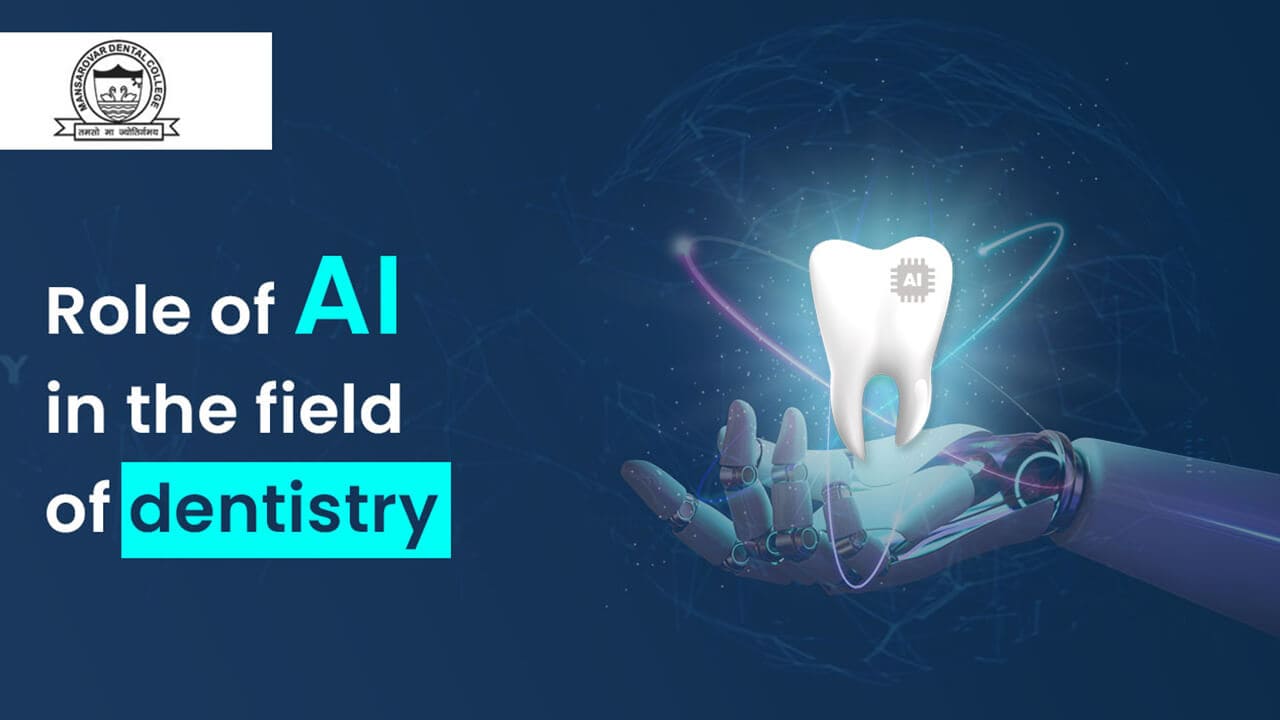
Artificial intelligence (AI) is generating applications in every conceivable field, and in this article, you will get know-how AI is revolutionizing the field of dentistry. Artificial Intelligence (AI) as a technology is set to bring a revolution in computing and computing-based technologies. Together with machine learning, AI is said to be the base for the fourth industrial revolution.
AI has been integrated with many medical software programs and diagnostic tools, which helps dental clinicians make decisions and dramatically speed up diagnosis and treatment procedures. With the advent of artificial intelligence in dentistry and AI applications in dentistry, and AI-enabled instrumentations, recent research has found that both patients and doctors are more hopeful about the future of dentistry.
Future dentistry courses for students will focus on the application of artificial intelligence in dentistry for diagnosis and treatment, the use of digital assistants to help doctors and patients, automation of clinical tasks, etc. Future research in dentistry will also focus on developing AI-based low-cost technologies for cost-effective dental treatment and diagnosis. Although it's predicted that the AI-based new methods of treatment and oral care can reduce the demand for dentists and dental health professionals, however, with the introduction of artificial intelligence in dentistry courses, future dentists will be much better equipped to take on the challenges of the future.
Artificial intelligence (AI) is a computer program or set of algorithms that can perform tasks that were traditionally performed with the use of intelligent living beings. The term AI is usually used to refer to systems that can mimic human intellectual processes and decision-making.
AI uses machine learning, neural networks, natural language processing, and advanced computing to develop models that replicate the human mind in performing specific tasks. AI has far-reaching applications in almost every conceivable field, from medical science to self-driving vehicles to farming and much more.
Also Read: Know which one is your calling - General Dentistry or Cosmetic dentistry?
There are numerous clinical applications of AI that are used in dentistry.
AI-based devices have shown an excellent ability to detect, identify and classify anatomical structures. Many neural networks have been successfully trained to identify and label teeth from periapical radiographs, with a precision rate of 95.8–99.45% in detecting and identifying teeth, almost rivaling clinical experts, who have a precision rate was 99.98%.
Advanced AI algorithms are also known to detect and identify dental cavities and lesions with 75.5–93.3% accuracy.
AI has immense potential to aid and automate the clinical decision-making process in orthodontic treatments, like teeth extraction etc. In orthodontics, it is crucial to carefully plan treatments to achieve desirable outcomes for patients. Moreover, AI-based 3D printing can help quickly build low-cost dental crowns and bridges that are specifically made as per the patient's needs.
Because of the intricate nature of the pathogenesis of the disease, no single clinical and microbiological test or clinical expert of them can discriminate between an aggressive and chronic form of periodontal disease. However, well researched and developed AI algorithms can detect, identify, and classify periodontal diseases with high precision.
AI-based algorithms can consider many factors like monocyte, eosinophil, neutrophil counts, and CD4+/CD8+ T-cell ratio to accurately diagnose periodontal diseases and recommend various non-surgical and surgical treatments.
AI-based tools and algorithms are successfully used to minimise treatment failures due to morphological differences and optimise endodontic therapy's clinical outcomes. Traditional technologies like CBCT use high radiation doses, because of which they are not used as standard treatment methods. A possible solution to this challenge is using AI to analyse the radiographs and detect extra canals.
AI-based solutions also have the ability of machine learning and deep learning, i.e., they perfect themselves with each use. As more and more clinical data is fed into the system, it becomes better and better, thus improving its accuracy.
AI is also used to detect and diagnose oral lesions and significantly improves prognosis. AI-based diagnosis can also accurately detect and identify precancerous or cancerous oral lesions.
Also Read: Career Outlook of a Dentist
It's by far the biggest challenge in the implementation of AI systems in health care. AI algorithms depend on data to perfect and train themselves for various cases and situations; most of this data comes from the personal data from hospitals, patients and doctors, so issues like ethical collection and usage of data, confidentiality and privacy are always there. Scepticism regarding data collection and sharing will always be there, which can hinder the development of AI.
Although AI algorithms are built using a lot of care, precaution, research, and rigorous testing, they can still fail. Therefore, the question always remains: who will be held responsible and accountable in case of AI system failure? Is it the fault of the dentist and dental health professionals, or is it the fault of the developer who built the algorithm?
Further, there is always the ethical question of a robot or machine between the doctor and the patient, which can highly influence the decision-making of the doctor.
Since AI algorithms are developed after a lot of research, trials, and expenditure, they are the developer's utmost protected intellectual property. Doctors may never know the parameters on which the algorithms are based, the system's decision-making process, and trial reports of the system. All of this can hinder a doctors' ability to optimize the system for their patients.
It's feared by many medical professionals that AI will dominate and monopolize the medical decision-making process, with doctors just required to rubber-stamp the decision made by AI systems.
If you want to build up a lucrative career in dentistry and learn about the application of artificial intelligence in dentistry, join the BDS program at Mansarovar Dental College, the best dental college in MP. Being the best dental college in Madhya Pradesh, Mansarovar Dental College offers courses in Four Disciplines, namely Prosthodontics, Orthodontics, Periodontics, Conservative, and Endodontics. It also provides unique prospects for students to get involved in various Research and Development projects associated with multiple organizations.
© 2017 Mansarovar Dental College Powered by SynQues